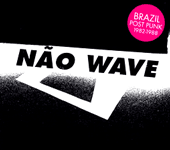|
|
 |
Dusted Reviews
Artist: V/A Album: Não Wave & The Sexual Life of Savages Label: Man Recordings / Soul Jazz Review date: Jul. 7, 2005 |

|
|
|
 |
Brazil’s major musical exports can be summed up by two words – samba and tropicalia – and one decade – the 1960s. The former was an indigenous movement, combining African style drumming with the rhythm and flow of the Amazon; the latter was at least partially imported, the result of the synthesis of late-’60s psychedelia with that same Amazonian rhythm, and a political fervor that can only emerge from life under a military dictator. Both were incredibly original and inventive in their use of rhythm, song structure and arrangement. Of course, Luiz Bónfa and Antonio Carlos Jobim were creating the progenitors of samba in the late ’50s, and all the major tropicalistas (Os Mutantes, Caetano Veloso, Gilberto Gil, Tom Ze, etc) would continue to make original music into the 1970s and beyond. But after the burst of creativity in the 60s, Brazilian music seemed to dry up, with nothing new of note to add to the sounds of the greater world, caused perhaps by military crackdowns of the ’70s, or perhaps by other pressures. It’s hard to be totally sure of these things.
Then the dictatorship fell, and the musical world of Brazil experienced a revival – or so the compilers of these two CDs would have you believe. The thrust of their argument is simple; starting around 1982 in a bunch of small São Paolo clubs, a group of young Brazilians started pushing Brazilian music in a new direction by playing post-punk. The grand testament of the scene was the Não São Paolo comp, which compiled its major groups and is supposedly comparable to No New York. The major fallacy of the argument is that this scene really had very little new to add to the already mature post-punk world. By 1982, all the of the major post-punk albums (Second Edition, Entertainment!, Talking Heads 77, etc) had already been released; new wave and MTV had already entered the northern hemisphere’s mainstream, making post-punk just another musical commodity. So these Brazilian post-punks weren’t really that inventive, they were just slow to get on the wagon.
Almost every song between these two compilations can be traced back to some other American or British equivalent, something which the liner notes for both are quick to point out. Prime examples include Mercenárias, the Brazilian version of the Slits, Voluntarios de Patria are a kind of Talking Heads clone, Fellini sounds strangely like the Fall, and Ira! could easily be Gang of Four in the jungle. Within these two discs, there is very little variation from the rules of post-punk, with clipped guitar chords, danceable bass lines, and springy drum beats of all sorts, raising the question of whether it is even possible for there to be any large variations within post-punk. Looking around the contemporary post-punk/dance punk scene (the Rapture, !!!, Radio 4, and so on), there is very little deviation from the rules. Post-punk could, in fact, be a form that was so well defined by its earliest players that nobody can really venture further.
That said, these CDs do give somewhat different interpretations of the nature of this decade spanning scene. Soul Jazz’s The Sexual Life of Savages offers the more straightforward compilation, giving us a view of the scene as essentially Anglo-American post-punk sung in Portuguese. The songs are almost entirely derivative and, save for the language and the resulting differences in flow, one could hardly tell that this is Brazilian music. The Não Wave CD, on the other hand, does give at least some sense of the local flavor. A few of the songs, like those of Black Future, Akira S & As Garotas Que Erraram, and Vzydaq Moe, do manage to capture at least a bit of the spirit of samba, mostly through their use of local percussion and a vocal cadence closer to Caetano Veloso than Gary Numan. This divergence is not surprising, given Soul Jazz’s general set of prejudices. One need only look at the recent Arthur Russell reissues to get this sense: Soul Jazz’s disc compiled all the dance output, while it took a smaller label, Audika, to reissue his other works. These two CDs are no different.
While it’s impossible to call these discs a disappointment, as they do document a scene that would have otherwise remained hidden to the world, it is also impossible to say that these discs are in any way revolutionary. If those Brazilians through the ’80s had managed to add something new to the formula, then I would be singing these discs praises left and right. That nice falls instead on their Baile funk contemporaries, whose music is only just now coming to light as a radical rethinking of the sounds and rhythms of the jungle. But as it stands, many of these songs are interesting only because they are sung on Portuguese, unlike their elders, samba and tropicalia. The secret to the latter’s success is exactly what post-punk lacks: a quintessentially Brazilian sense of leisure. When you are a robot thrashing around in a solid lockstep rhythm, it’s hard to notice the rainforest around you.
By Dan Ruccia
|







